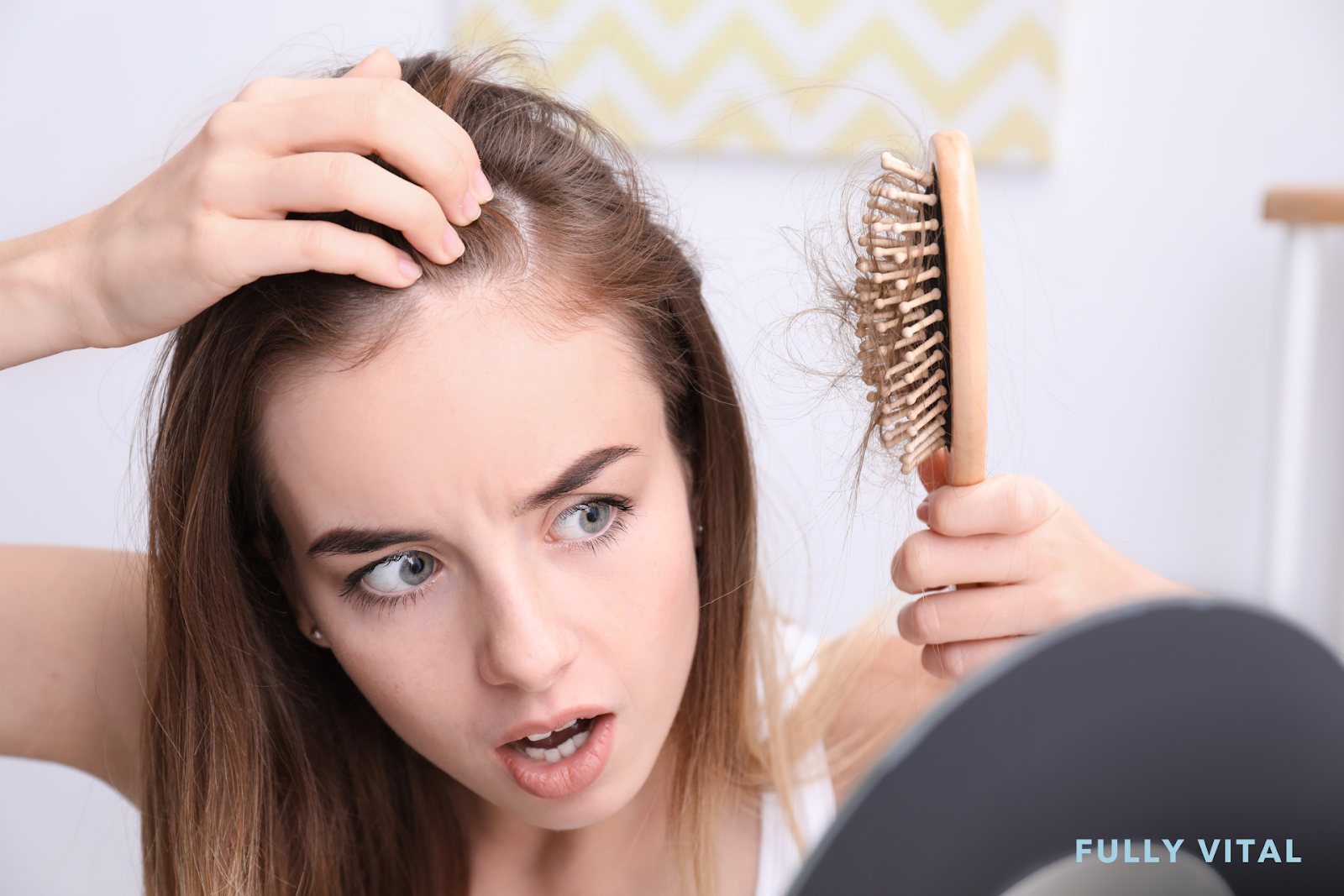
Understanding Crown Balding: Causes, Treatments, And Solutions
Hey there! If you've noticed your hair thinning or a bald spot at the crown of your head, you're not alone.
Many of us experience crown balding, and it can be a frustrating and concerning experience.
But fret not, as I'm here to help shed some light on this common issue.
From the potential causes of crown balding to the various treatments and solutions that stimulate hair growth, we'll explore it all.

I LOVE MY HAIR NOW
FullyVital hair serum and hair vitamins made tremendous improvements in my hair. I truly love my hair now.
Dorit S.,
So, grab a comfy seat and let's dive into the world of crown balding together!
Understanding Crown Balding
When it comes to crown balding, it's essential to understand the causes, treatments, and solutions.
Many factors can contribute to crown balding, such as genetics, hormone imbalances, and lifestyle choices.
Understanding the root cause of your crown balding can help you determine the most effective treatment for your specific situation.
By addressing the underlying cause and utilizing science-backed hair growth products, you can take proactive steps to slow down and reverse the effects of crown balding, leading to a healthier and more vibrant mane.
Common Causes Of Balding At The Crown
Understanding the reasons behind balding at the crown is key to addressing it. Let’s look at the most common causes:
Genetics
Genetics play a pivotal role in determining the likelihood of experiencing balding at the crown.
If your family has a history of balding or thinning hair, particularly in the crown area, this genetic predisposition increases your chances of encountering similar hair loss issues.
This form of balding is often hereditary and follows a pattern that is predictable based on your family history.
Understanding your genetic makeup can provide insights into the potential for crown balding and the rate at which it may progress.
Hormonal Changes
Hormonal changes are a significant factor in crown balding.
These fluctuations are particularly noticeable during life stages such as pregnancy, menopause, or as a result of certain medical conditions like thyroid disorders.
The changes in hormone levels, especially androgens (male hormones that females also have), can cause hair follicles to shrink, leading to hair thinning and loss.
This process, often more pronounced in women, can result in noticeable balding at the crown.
Aging
Aging is a natural process that can significantly impact hair health, leading to thinning and balding, especially at the crown.
As we get older, our hair follicles gradually lose their ability to regenerate and produce new hairs.
This decrease in follicular activity is a normal part of aging, but it can be more pronounced in some individuals, leading to more significant hair loss.
The rate and extent of hair loss due to aging vary widely among individuals, but it is a common factor in crown balding.
Stress
Chronic stress is a well-known factor that can negatively affect hair health, potentially leading to crown balding.
Prolonged stress can disrupt the normal hair growth cycle, causing more hair to enter the shedding phase.
This can lead to noticeable thinning and balding at the crown.
Stress can also exacerbate other conditions that contribute to hair loss, making it a significant factor in the overall health of your hair.

Poor Nutrition
Nutrition plays a crucial role in maintaining healthy hair.
A diet lacking in essential nutrients, such as vitamins (like biotin and vitamin D), minerals (such as iron and zinc), and proteins, can adversely affect the health and strength of your hair.
This deficiency can lead to weakened hair strands, reduced hair growth, and eventually, noticeable thinning and balding at the crown.
A balanced diet rich in these nutrients is essential for maintaining healthy hair and potentially preventing or slowing the progression of crown balding.
The Connection Between Genetics And Crown Balding
Genetics can play a major role in crown balding.
If your parents or grandparents experienced balding or thinning hair at the crown, you may be more susceptible to the same issue.
While genetics can predispose you to crown balding, it's essential to remember that understanding this connection can empower you to take proactive steps to address and manage your hair health.
By using science-backed hair growth products from Fully Vital, you can work towards slowing down and potentially reversing the effects of genetic crown balding.
The Impact Of Lifestyle Choices On Crown Balding
Our daily habits and lifestyle choices can significantly influence the health of our hair, including the potential for crown balding.
Factors such as excessive heat styling, tight hairstyles, and using harsh chemical treatments can contribute to hair damage and thinning, including at the crown.
Additionally, smoking, excessive alcohol consumption, and poor stress management can also impact the overall health of our hair, potentially leading to crown balding.
By adopting healthier lifestyle choices and integrating science-backed hair growth products from Fully Vital into your routine, you can work towards supporting the vitality and resilience of your hair, potentially mitigating the effects of lifestyle-related crown balding.
The Role Of Stress In Crown Balding
Stress can play a significant role in crown balding.
Let's explore how it impacts hair loss in this area:
Stress As A Contributing Factor
Stress has a significant physiological impact that can exacerbate hair loss.
It leads to hormonal imbalances, and emotional stress can trigger conditions like telogen effluvium, where hair prematurely enters the resting phase and subsequently falls out.
Types Of Stress Related To Balding
Chronic stress, which affects the body over a prolonged period, can disrupt normal hair growth cycles, leading to more noticeable balding.3
In contrast, acute stress, characterized by sudden and intense stress events, can also trigger hair loss, though this is often temporary.
Mechanisms Linking Stress And Balding
The overproduction of cortisol due to chronic stress is one way in which stress affects hair follicle health.
Stress can also constrict blood vessels, reducing blood flow to the scalp, which is crucial for healthy hair growth.
Managing Stress To Mitigate Balding
Incorporating relaxation techniques such as meditation, yoga, and deep breathing can help in managing stress levels.
Seeking professional help, such as therapy or counseling, is also beneficial in dealing with chronic stress and its effects on health, including hair loss.
How To Treat Crown Balding
Crown balding, often part of male or female pattern baldness, can be influenced by genetics, age, hormones, and other factors.1
Let's explore the most effective ways to treat it:
- Medications: There are FDA-approved medications like Minoxidil (Rogaine) and Finasteride (Propecia) that can help in slowing hair loss and promoting regrowth.2
- Topical Treatments: Besides Minoxidil, there are other topical solutions and serums that can stimulate hair growth.
- Hair Transplant Surgery: This involves moving hair from other parts of your head to the balding area.
- Laser Therapy: Low-level laser therapy can stimulate hair growth for some individuals.
- Lifestyle Changes: Diet, stress management, and avoiding harsh hair treatments can sometimes help.
- Natural Remedies: Some people find natural oils and supplements beneficial, although their effectiveness isn't always scientifically proven.
- Consult a Dermatologist: It's important to consult with a healthcare provider to determine the best course of action based on the specific case.
- Scalp Micro-pigmentation: A cosmetic procedure that gives the appearance of a fuller head of hair.

Experience The Power Of Fully Vital Hair Growth ProductsDiscover how Fully Vital Hair Growth Products can transform your hair health. Let’s examine their effectiveness and benefits:
Experience the transformative benefits of Fully Vital hair growth products and unlock the potential for healthier, more youthful-looking hair. |
Final Thoughts On Crown Balding
In the battle against crown balding, knowledge is indeed power.
By understanding the various causes of crown balding, such as genetics, hormonal changes, aging, stress, and lifestyle choices, you can take proactive steps to address this common concern.
From prioritizing stress management and adopting healthier lifestyle habits to utilizing science-backed hair growth products from Fully Vital, you can work towards slowing down and potentially reversing the effects of crown balding.
Remember, the journey to healthier, more vibrant hair is a marathon, not a sprint. Each small step you take, whether it's incorporating nutrient-rich foods into your diet, practicing stress-relief techniques, or using targeted hair growth products, can contribute to the overall health and resilience of your hair, including the crown area.
At Fully Vital, we stand by our mission to create powerful science-backed hair growth products designed to help you slow down and reverse the aging of your hair.
With our innovative solutions, you can embrace your journey to healthier, more youthful-looking hair with confidence.
So, as you continue on your path to addressing crown balding and nurturing your hair's vitality, remember that you're not alone.
By staying informed, proactive, and empowered, you can take charge of your hair health and experience the joy of a more vibrant mane for years to come.
Check out our recent blogs:
- Derma Roller For Hair: Unlocking The Potential For Hair Growth
- Derma Roller For Beard: Stimulate Hair Growth Naturally
- Derma Roller For Face, Scars & Wrinkles: Benefits, Uses And More
Frequently Asked Questions on Crown Balding
How do you block DHT naturally?
To naturally block DHT, you can consider incorporating foods and supplements such as saw palmetto, pumpkin seed oil, green tea, and specific vitamins into your diet.
How long does it take for crown to go bald?
The timeline for crown balding can vary from person to person.
It can take several years for noticeable thinning or balding to occur.
How can I hide my thinning hair on my crown?
You can hide thinning hair on your crown by using hair fibers, styling techniques, or wearing hats or scarves.
Does Minoxidil work for crown balding?
Minoxidil can be effective in promoting hair regrowth, including on the crown.
However, individual results may vary.
Is it normal to see scalp at crown?
It is not uncommon to see some scalp at the crown, especially as we age and hair density decreases.
However, extensive scalp visibility may indicate a balding or thinning issue.
How can I regrow my crown hair naturally?
You can promote natural crown hair regrowth by maintaining a healthy diet, managing stress, using scalp massages, and trying natural hair growth products.
Should I shave my head if my crown is balding?
Shaving your head is a personal choice.
It can be a way to embrace balding or thinning hair, but it's not the only option.
Many people choose to work with hair growth products and styling techniques to address crown balding.
What age does crown balding start?
Crown balding can start at various ages, with some individuals noticing it in their twenties, while others may experience it later in life.
Which vitamin deficiency causes hair loss?
Vitamin D, vitamin E, vitamin A, vitamin B12, and iron deficiencies are known to contribute to hair loss, including crown balding.
Does biotin help with thinning crown?
Biotin is often recommended for promoting overall hair health, including addressing thinning crown.
However, individual responses to biotin may vary.
Sources:
- Mayo Clinic. (2023, March 31). Male pattern baldness. https://www.youtube.com/watch?v=IZMsGxHIVqE
- U.S. National Library of Medicine. (2019, September). Hair loss: MedlinePlus Medical Encyclopedia. https://medlineplus.gov/hairloss.html
- American Hairloss Association. (2023). Hair loss options for men. https://www.americanhairloss.org/men_hair_loss/







